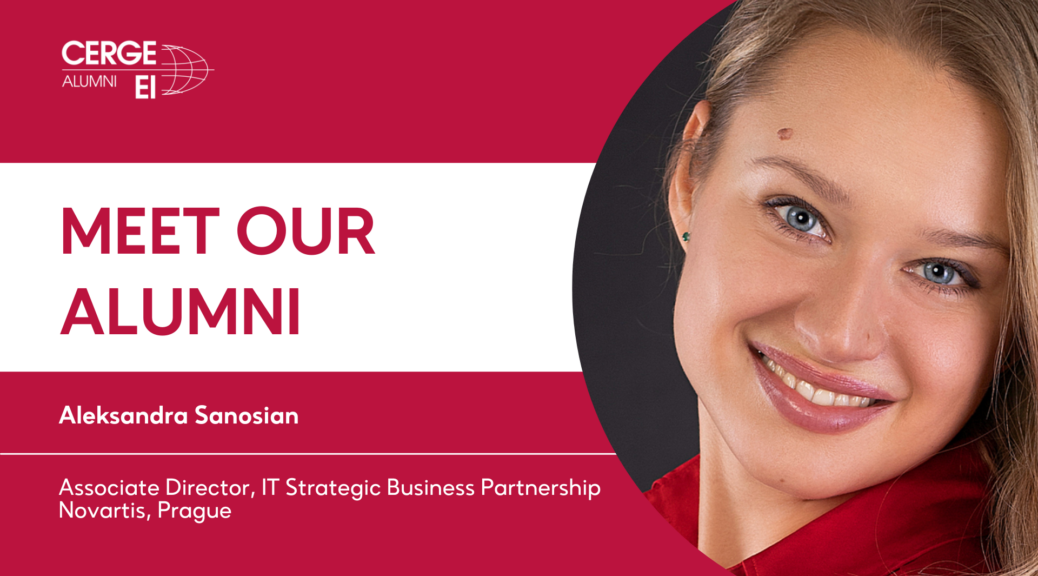Alexandra Sanosian, our 2013 MA graduate, works as Associate Director, IT Strategic Business Partnership at Novartis, Prague. What does she like about her job and how did her CERGE-EI studies help her in her career?
Why did you decide to study economics at CERGE-EI?
I was finishing my MA in Math in Kharkiv, Ukraine, and I had a vision to relocate to Europe/USA and study something more applied to business while still benefiting from my STEM background. Economics was a favorable next step for me and CERGE-EI is one of the best-ranked universities to do economic research. CERGE-EI is located in fairytale Prague and provides full financial support to students. It was hard to resist! To be fair, I applied to more programs abroad because I wanted to be sure that at least one would accept me, but in the end, I chose CERGE-EI, and I’m happy with this choice!
You worked in several business companies, currently as Associate Director of IT Strategic Business Partnership at Novartis. What is your role as Associate Director?
After working in Strategy Consulting for several years, I converted back to the IT domain. I work with Corporate Business Functions in Novartis (like Global Security, Communications, and Risk) and help assess their demands, and define their needs and value that IT solutions can bring versus the costs. Once we are confident that business is favorable, I convert the demand into a project and ensure it is delivered and brings the promised value. “
What projects are you currently working on?
Now, I manage a project, which will enable Novartis to quickly identify and eliminate fake medicines in the field, thanks to having portable spectrometers. This project inspires me because it has a direct impact on patients and it combines IT, physics, and data science. You can read more about it at https://live.novartis.com/article/fighting-fake-medicines/fighting-fake-medicines-deepening-collaboration If it goes as planned, you might hear about it soon, cause we will be the first in the Pharmaceutical industry to do anything like that.
What do you like the most about your job and what is the most challenging for you?
The diversity of my projects, the impact they can have on society and other businesses, and my own independence on how I approach things, is what I like the most. I actually like having challenges, without them I get bored. The challenges I have now consist of: continuously learning new things, working in multi-cultural environments with a team spread across the world, and maintaining a work-life balance.
What from your CERGE-EI studies has helped you in your career?
Lots of things, but first the people I met at CERGE-EI helped me the most. Thanks to them, I got my social grid set up in the Czech Republic: students from my cohort, alumni, professors, and Study Affairs Office who keeps us all together. We went through some challenging times with my classmates and that bounded some of us. Up until now, we evolve and inspire each other. The professors had broad international experience and shared their life and career aspirations with us. CERGE-EI has alumni who possess top positions in the field of their choice, and who are approachable, so you could talk to them about your “dream job”, see how they feel being there, and what they would advise.
CERGE-EI’s English-speaking and international environment was a game-changer for me back then. I spoke English quite well before, but it was only at CERGE-EI that all my thoughts and even dreams at night started to be in English.
The economic subjects were indeed helpful yet played less of a role for me. Analytical skills, critical thinking, and the ability to express your thoughts are clearly important for what I do.
What do you perceive as the strongest message CERGE-EI gives to its students?
I perceive the message now as: “We will give you a chance to study at the top university for economic research. Take this opportunity and use it fully. It will be hard, but it is worth it.”
In terms of the strongest message received while I was a student at CERGE-EI, I remember prof. Randall Filler welcomed us, freshmen, in Prague in 2011 with a phrase: “All of you are probably used to being the smartest person in the room. Now, guess what? There is only one smartest person in this room. But that’s not what matters the most.”
To me as a hard-skill-driven person, this was a surprising conclusion, and it took me years to realize that indeed, being the smartest is not the ultimate goal. All in all, it converts to building a community and collaborating between diverse and talented people.
